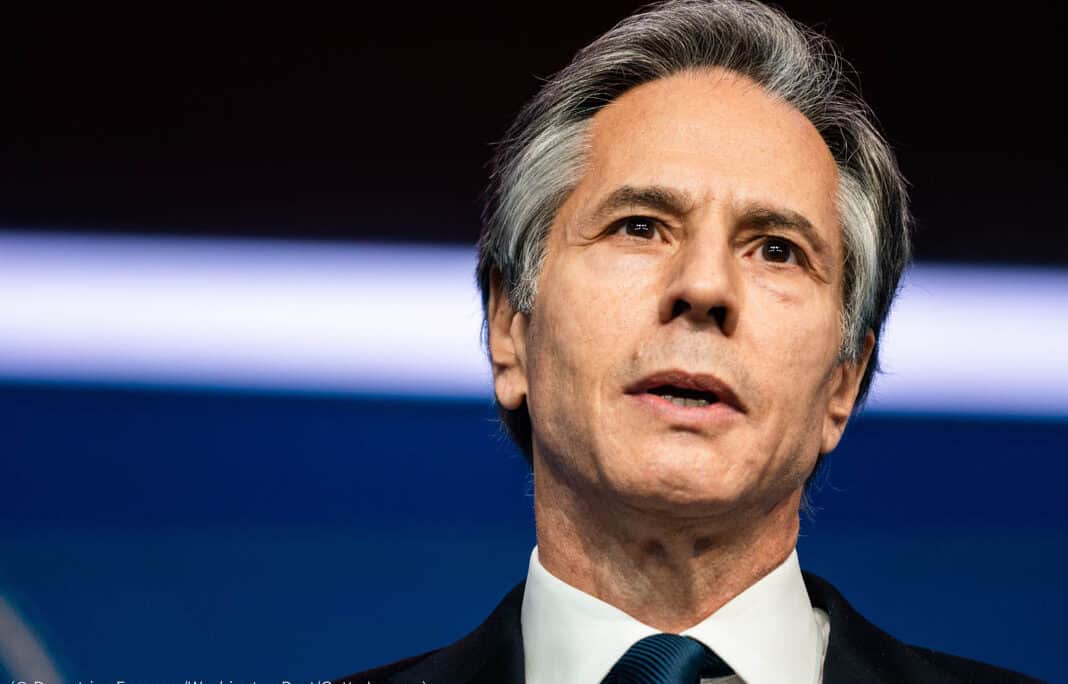United States Secretary of State Antony Blinken will visit the Pacific this week – his third foray to the region – to discuss security co-operation with New Zealand and Australia.
The State Department said Blinken would also attend the FIFA Women’s World Cup in Aotearoa.
But first, he will dedicate the U.S. embassy in Tonga on Wednesday – a move many experts say is part of Washington’s plan to counter China’s growing influence in the Pacific.
In February, the U.S. reopened its embassy in the Solomon Islands after a 30-year absence and is planning missions in Vanuatu and Kiribati.
Blinken will meet Prime Minister Chris Hipkins and Foreign Affairs Minister Nanaia Mahuta.
“Our countries have a strong and longstanding relationship, which is based on close cooperation across our many shared values and issues of strategic interest to us both,” Mahuta said in a statement.
“I look forward to productive discussions with Secretary Blinken on global and regional security issues that matter to both our countries including our wider bilateral relationship, the war in Ukraine, climate change, Pacific resilience and regional economic recovery.”
The White House has stepped up engagements with Pacific island nations after several Chinese government officials visited the region in the past 12 months.
President Joe Biden will host Pacific leaders in a second summit in Washington in September, the White House said.
At the first meeting last September, Biden promised “substantial” funding for the Pacific as part of the partnership strategy worth US$800 million (NZ$1.34 billion).
But Congress has yet to approve the president’s economic assistance package to the island nations.
Biden’s US$400billion Aukus deal, which will see the U.S. and United Kingdom provide a fleet of nuclear-powered submarines to Australia by the mid-2050s, has also hit a hurdle.
Senate Republicans are threatening to block the sale unless the president boosts funding for the domestic production line
Since Aukus was formalised in March, the Pacific Islands Forum has condemned the security pact with experts claiming the deal is keeping Washington firmly engaged in the region.
“Aukus will bring war much closer to home and goes against the Blue Pacific narrative on nuclear proliferation and the cost to climate change,” the forum said in a statement.
Solomon Islands signed a second security pact with Beijing last week, the first sealed in April 2022, which allows prime minister Manasseh Sogavare to call on China at any time for assistance.
The latest agreement will see Chinese police presence in the Solomons capital Honiara until 2025, which has the U.S. and its allies concerned.
Sogavare also announced his government wants to establish a military force which has been supported by New Zealand and Australia, both “stand ready to assist”.
Sogavare had earlier awarded a multi-million-dollar contract to a Chinese state company to upgrade the international port in Honiara.
The U.S. fears China aims to build a naval base in the Pacific, but Sogavare told a media conference his country’s security agreements with Beijing would not undermine peace in the region.
The Solomon Islands switched diplomatic ties to China in 2019 from a previous relationship they had held with Taiwan since 1983.
The U.S. is also trying to renew pacts with the Marshall Islands, Palau and the Federated States of Micronesia (FSM).
The deal will see Washington retain responsibility for the three island nations’ defence and gain exclusive access to the western Pacific.
Blinken arrives in Wellington, Te Whanganui-a-tara, on Thursday and will meet with senior government partners before attending the U.S. women’s football match against the Netherlands at the Regional Stadium from 1pm.
He heads to Brisbane on Friday where he will join Secretary of Defence Lloyd J Austin III at the U.S.-Australia security and foreign ministers meeting.
French President Emmanuel Macron is also travelling to the Pacific this week, with his office announcing visits to New Caledonia, Vanuatu and Papua New Guinea. The visits to Port Vila and Port Moresby will make Macron the first French leader to travel there.
